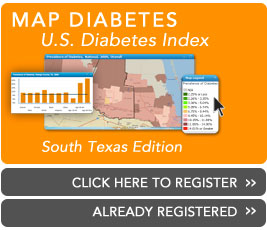Posted by Staff
Minority Diabetes Reports
Wednesday, October 23rd, 2013
Diabetes Care October 15, 2013
Objective This cross-sectional clinical study compared the pathophysiology of type 2 diabetes in Japanese and Caucasians and investigated the role of demographic, genetic, and lifestyle-related risk factors for insulin resistance and beta-cell response.
Research Design and Methods A total of 120 Japanese and 150 Caucasians were enrolled to obtain comparable distributions of high/low BMI values across glucose tolerance states (normal glucose tolerance, impaired glucose tolerance, and type 2 diabetes), which were assessed by oral glucose tolerance tests. BMI in the two cohorts was distributed around the two regional cut-off values for obesity. Read More
Posted by Staff
Minority Diabetes Reports
Wednesday, October 23rd, 2013
Diabetes Care October 15, 2013
Objective Clinical trials to date have not provided definitive evidence regarding the effects of glucose lowering with coronary heart disease (CHD) risk among diabetic patients.
Research Design and Methods We prospectively investigated the association of HbA1c at baseline and during follow-up with CHD risk among 17,510 African American and 12,592 White patients with type 2 diabetes.Read More
Posted by Staff
Minority Diabetes Reports
Wednesday, October 23rd, 2013
American Journal of Public Health: 6/13/13
Objectives. We evaluated the effectiveness of a community-based healthy lifestyle intervention in improving dietary behaviors of pregnant Latinas from 2004 to 2006 in Detroit, Michigan.
Methods. The 11-week, culturally tailored, Spanish-language Healthy Mothers on the Move (MOMs) intervention offered home visits, group classes, related activities, and social support from trained community health workers (CHWs) and peers. Dietary behaviors were measured by food frequency questionnaire. Linear mixed models estimated pre- and post-intervention changes, within and between MOMs intervention and minimal intervention (MI) groups. Read More
Posted by Staff
Minority Diabetes Reports
Wednesday, October 23rd, 2013
Medical News Today: 10/23/13
A research team led by Anastassios G. Pittas, MD, MS, Endocrinologist and Co-Director of the Diabetes Center at Tufts Medical Center in Boston, has received a National Institutes of Health (NIH) grant of more than $40 million over five years to conduct the Vitamin D and Type 2 diabetes (D2d) study.* D2d is a nationwide clinical trial to determine if vitamin D supplementation can reduce the likelihood of developing type 2 diabetes in people who are at high risk for this serious metabolic disorder.
Despite a lack of conclusive evidence to the effectiveness of vitamin D for conditions not related to bone health, sales of vitamin D supplements in the United States have skyrocketed to $425 million annually, making it one of the top selling supplements in the country and one of the most talked about topics in health and medicine. The D2d study, which is coordinated out of the Division of Endocrinology at Tufts Medical Center, is the first of its kind to specifically examine whether vitamin D has an effect on prevention of type 2 diabetes. Read More
Posted by Staff
Clinical Trials
Wednesday, October 23rd, 2013
Diabetes Care: October 21, 2013
OBJECTIVE —To assess the efficacy and safety of dapagliflozin as add-on therapy in patients with type 2 diabetes who were inadequately controlled with a dipeptidyl peptidase-4 inhibitor with or without metformin.
RESEARCH DESIGN AND METHODS —In this 24-week, multicenter, randomized, double-blind, placebo-controlled, parallel-group, phase 3 study with a 24-week blinded extension period, 432 patients were randomized to receive dapagliflozin 10 mg/day or placebo added to sitagliptin (100 mg/day) ± metformin (≥1500 mg/day). Read more
Posted by Staff
Clinical Trials
Wednesday, October 23rd, 2013
Diabetes Care October 21, 2013
OBJECTIVE To assess the efficacy and safety of 32 mg naltrexone sustained-release (SR)/360 mg bupropion SR (NB) in overweight/obese individuals with type 2 diabetes with or without background oral antidiabetes drugs.
RESEARCH DESIGN AND METHODS This was a 56-week, double-blind, placebo-controlled study in which 505 patients received standardized lifestyle intervention and were randomized 2:1 to NB or placebo. Co–primary end points were percent weight change and achievement of ≥5% weight loss. Secondary end points included achievement of HbA1c <7% (53 mmol/mol), achievement of weight loss ≥10%, and change in HbA1c, waist circumference, fasting blood glucose, and lipids. Read more
Posted by Staff
Clinical Trials
Wednesday, October 23rd, 2013
The Lancet Diabetes & Endocrinology, Early Online Publication, 18 October 2013
Background
Metformin is the only first-line oral hypoglycaemic drug for type 2 diabetes recommended by international guidelines with proven efficacy, safety, and cost-effectiveness. However, little information exists about its use in Asian populations. We aimed to ascertain the effectiveness of the α-glucosidase inhibitor acarbose, extensively adopted in China, compared with metformin as the alternative initial therapy for newly diagnosed type 2 diabetes.
Methods
In this 48-week, randomised, open-label, non-inferiority trial, patients who were newly diagnosed with type 2 diabetes, with a mean HbA1c of 7·5%, were enrolled from 11 sites in China. After a 4-week lifestyle modification run-in, patients were assigned to 24 weeks of monotherapy with metformin or acarbose as the initial treatment, followed by a 24-week therapy phase during which add-on therapy was used if prespecified glucose targets were not achieved. Primary endpoints were to establish whether acarbose was non-inferior to metformin in HbA1c reduction at week 24 and week 48 timepoints.
Read more



























